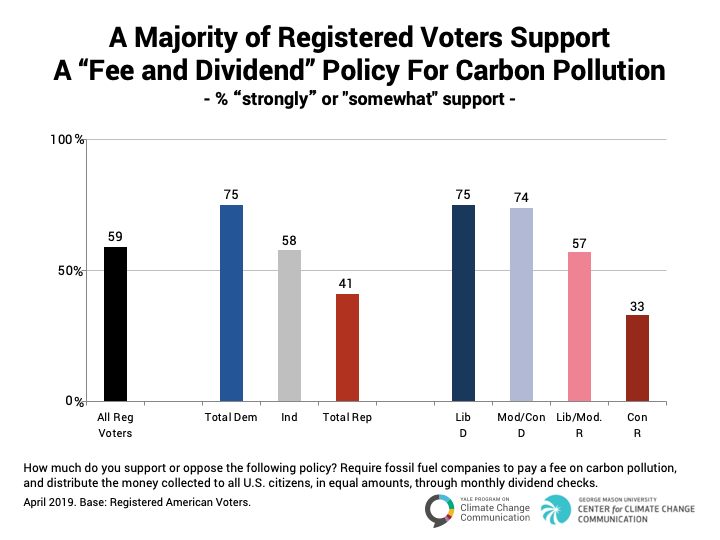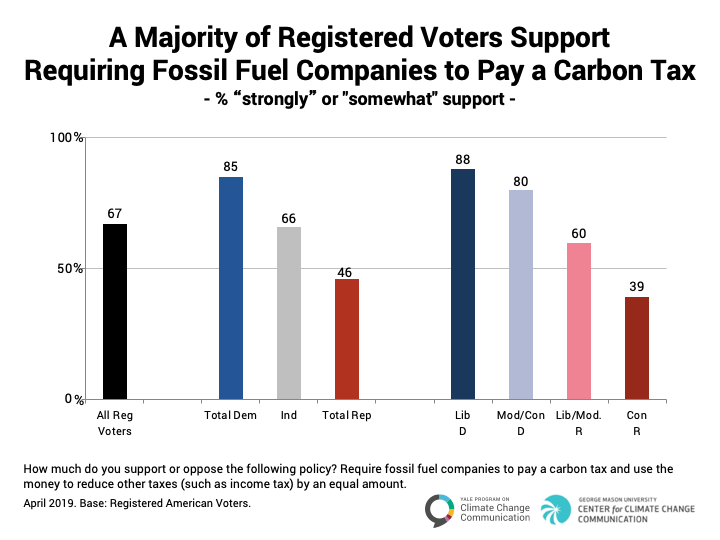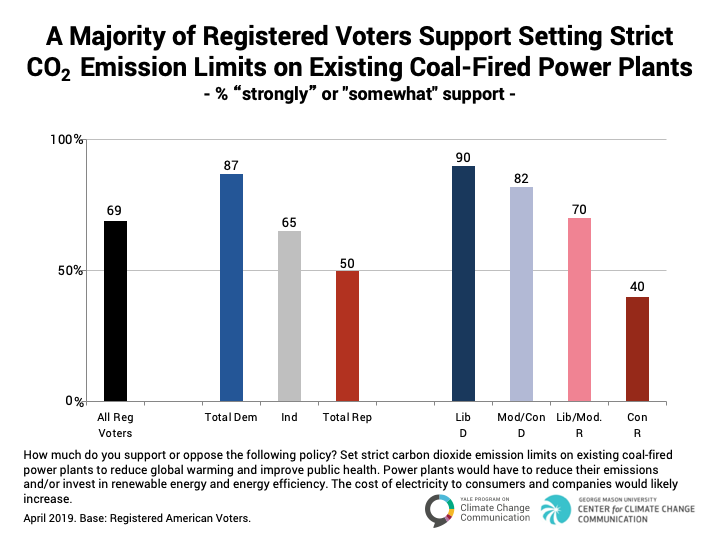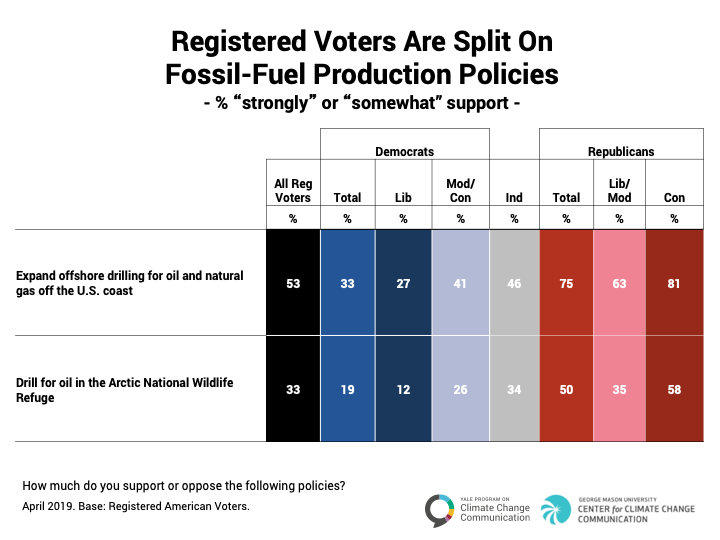Report · May 16, 2019
Politics & Global Warming, April 2019
By Anthony Leiserowitz, Edward Maibach, Seth Rosenthal, John Kotcher, Matthew Ballew, Matthew Goldberg, Abel Gustafson and Parrish Bergquist
Filed under: Policy & Politics, Beliefs & Attitudes and Behaviors & Actions
3. Support for Policies to Address the Pollution that Causes Global Warming
3.1. Large majorities of registered voters support reducing the pollution that causes global warming through investments, regulations, and/or taxes.
Large majorities of registered voters across the political spectrum support reducing the pollution that causes global warming through investments in renewable energy research and infrastructure (87%), regulating pollution (82%), and/or taxing pollution (72%).
Majorities of Democrats, Independents, and Republicans support each of these approaches, although fewer than half of conservative Republicans support taxing pollution (44%; see Data Tables).
3.2. A majority of registered voters support a “Fee and Dividend” policy for carbon pollution.
A policy for mitigating global warming that is currently under consideration is a “Fee and Dividend” policy https://citizensclimatelobby.org/carbon-fee-and-dividend/ in which fossil fuel companies would pay a fee on the carbon pollution they produce, and all the money collected would be distributed to all U.S. citizens, in equal amounts, through monthly dividend checks.
About six in ten (59%) registered voters support a Fee and Dividend plan, including majorities of Democrats (75%) and Independents (58%). About four in ten Republicans (41%) support the plan, including more than half of liberal/moderate Republicans (57%) but only one in three conservative Republicans (33%).
3.3. A majority of registered voters support requiring fossil fuel companies to pay a carbon tax.
A similar proposal would require fossil fuel companies to pay a “carbon tax,” and would use the money to reduce other taxes by an equal amount. Two in three registered voters (67%) support this plan–often referred to as a “revenue-neutral carbon tax.”
Large majorities of Democrats (85%) and Independents (66%) support requiring fossil fuel companies to pay a carbon tax. Fewer Republicans (46%), including a majority of liberal/moderate Republicans (60%), but only about four in ten conservative Republicans (39%), support such a tax.
3.4. A majority of registered voters support setting strict carbon dioxide emission limits on coal-fired power plants.
About seven in ten registered voters (69%) support setting strict carbon dioxide emission limits on existing coal-fired power plants (a major component of the Environmental Protection Agency’s “Clean Power Plan”) to reduce global warming and improve public health, even if the cost of electricity to consumers and companies would likely increase.
Large majorities of Democrats (87%) and Independents (65%) support setting strict limits on coal-fired power plants. Half of Republicans (50%), including a large majority of liberal/moderate Republicans (70%), but only four in ten conservative Republicans (40%), support such limits.
3.5. Registered voters support climate-friendly energy polices.
Registered voters support several other climate-friendly energy policies, including many designed to reduce carbon pollution and dependence on fossil fuels and to promote clean energy. Democrats are the most likely to support such policies, but majorities of Independents and Republicans do as well. Majorities across the political spectrum support:
- Funding more research into renewable energy sources: 86% of registered voters, 96% of Democrats, 75% of Independents, and 77% of Republicans.
- Providing tax rebates to people who purchase energy-efficient vehicles or solar panels: 84% of registered voters, 94% of Democrats, 81% of Independents, and 75% of Republicans.
- Regulating carbon dioxide as a pollutant: 74% of registered voters, 91% of Democrats, 71% of Independents, and 57% of Republicans.
- Requiring electric utilities to produce at least 20% of their electricity from renewable energy sources, even if it costs the average household an extra $100 a year: 64% of registered voters, 80% of Democrats, 59% of Independents, but slightly fewer than half of Republicans (47%).
Large majorities of conservative Republicans support two of these policies: funding more research into renewable energy (72%) and providing tax rebates to people who purchase energy-efficient vehicles or solar panels (70%).
3.6. Registered voters are split on fossil-fuel production policies.
About half of registered voters (53%) support expanding offshore drilling for oil and natural gas off the U.S. coast, including 75% of Republicans, 46% of Independents, and 33% of Democrats.
By contrast, fewer registered voters (33%) support drilling for oil in Alaska’s Arctic National Wildlife Refuge (ANWR), while a large majority (67%) oppose it (see Data Tables). About six in ten conservative Republicans (58%) support this policy, but liberal/moderate Republicans (35%), Independents (34%), and Democrats (19%) are much less likely to support oil drilling in ANWR.
3.7. Many registered voters would support a president declaring a national emergency to act on global warming.
Forty-five percent of registered voters would “strongly” or “somewhat” support a U.S. president declaring global warming a national emergency to act on it without Congress. About two in three Democrats (65%), one in three Independents (32%), and one in four Republicans (26%) would support this. However, a majority of registered voters (54%; see Data Tables) would oppose it.
3.8. A large majority of registered voters say schools should teach children about global warming.
The Next Generation Science Standards for K-12 STEM (Science, Technology, Engineering, and Mathematics) education in the United StatesThe Next Generation Science Standards were developed by a collaboration of scientists and educators at the National Research Council of the National Academy of Sciences; the American Academy for the Advancement of Science; the National Teacher’s Association; 26 states; and Achieve (a non-profit organization). Released in 2013, the standards represent the most current, research-based method of educating K-12 students in STEM and preparing them for STEM careers. See: nextgenscience.org require that climate change be included in the curriculum, a mandate that is controversial in some parts of the country.
A large majority of registered voters (77%) support schools teaching children about the causes, consequences, and potential solutions to global warming. Support spans the political spectrum with nearly all Democrats (94%), seven in ten Independents (72%), and about six in ten Republicans (59%, including 51% of conservative Republicans) saying they support teaching about global warming.







